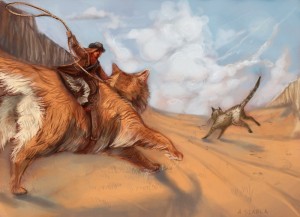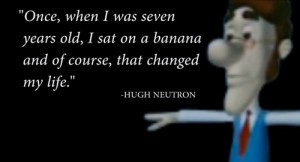Div and Des
Way back when, before the skies, before the stars, before anything, two beings existed. Two beings that were not like anything today, they had no characteristics, no size, colour, shape, smell, nothing they just simply were.
These beings lived for many years, thousands and thousands of years, in simple harmony with each other, exploring the big nothing that surrounded them.
One day the beings began to push into each other’s space, they began to test each other, to test dominance. They had grown tired of their peace. The two beings decided that they should be different; they wanted to be able to tell themselves apart.
So there in the big nothing these two beings that were pure entities of energy decided to give themselves an identity. The first being chose to keep its shapelessness but gave itself a white dewy color; it also chose a name, Div. Once Div had created itself the second entity wanted to do the same, it chose a colour as well, a murky grey and because it wanted to be different than Div it gave itself more rigid and sharper edges. The second entity wanted a name as well, but again it had to be different than Div, it chose the name Des.
Div and Des were quite happy with themselves and the time they had spent on making something in the big nothing. However much like they had grown tired of their peacefulness, they grew tired of their new characteristics they wanted to create more.
Div decided to create a tiny ball with blue liquid and green mush. Div was so proud of the little ball it was pretty and warm and made Div feel a sense of love inside it’s being. Div wanted more of that love feeling, so it decided to create little tiny moving fluffy things. Div made them big and small, Div made them like water or like the green mush, there were flying ones and swimming ones, things that burrowed and things that lived in the tall green mushy parts. Div loved her little ball with it’s little inhabitants and quickly forgot about Des, Div was too consumed by watching her ball to even notice what Des was doing.
Des became jealous that something else for the first time had Div’s attention. Des tried to create her own little blue ball but Des was too angry to make it as warm and as happy as Div’s and no little fluffies would stay on it. Des tried and tried and with every attempt Des became angrier and the balls became less blue and less happy.
Div was busy naming the blue ball and it’s inhabitants to see how upset Des was becoming. Div named the blue ball Earth and the liquid parts the seas and the green mushy parts the land and forests. The inhabitants all got names too, there were elephants who were big and smart, whales that were the elephants of the sea, mice which burrowed and scurried around, foxes that were beautiful and cunning, just to name a few. Div was growing more and more loving and warm with every new name or thing it created.
Des finally had enough, it had been years since Div gave any attention to Des and Des could no longer even form a ball; there was too much anger. Des sat and stewed for many years trying to think of a way to get back at Div, until one day Des thought up the perfect plan. Des knew the only thing that Div cared about was the little Earth and since Des could not make it’s own it decided to hurt Div’s. Des created rain clouds, practicing by sending little rainstorms over Div’s Earth. At first Div did not mind, the rain helped the land and forests grow which kept all the inhabitants happy.
This only enraged Des more, Des sat and practiced making the rain and liquids even more violent, until one day Des had created what it called a hurricane, a thunder storm, a flash flood, and lightening. Des was so delighted with it’s creation that for a moment Des hesitant to send it over Div’s Earth. Unfortunately the anger Des felt for Div was still growing.
Des sent all of it’s creations over Earth all at once. Div couldn’t stop it, the storms ravaged the little blue ball and overwhelmed the inhabitants, most of which never got up.
Div was devastated and Des was overjoyed, but only for a moment. Div quickly remade all the things that had perished and warned them all to lookout for Des, for Des was sure to do it again.
Sadly as much as Div warned them, the inhabitants didn’t know what to look for, they had no way to tell what Des was. So Des sent waves of storms and Div remade waves of inhabitants, for many years this was Earth’s cycle.
Finally the cunning fox asked Div what the storms names were, Div paused and said well Des created them, but Div had no name for the actually storms. Then an wise owl chimed in and suggested they name Des’s storms so they could warn each other and have a fighting chance. Div loved this idea and quickly asked all her creations what they wanted to call Des’s storms.
The inhabitants of Earth decided on Evil, it wasn’t similar to Div or any other name given and it was short enough to be shouted quickly as to warn each other of Des’s storms.
From then on Earth and it’s inhabitants knew Evil was out there and that it would come and try to hurt them, they knew that when Evil was shouted they needed to protect themselves.
Earth now knew Evil existed and some inhabitants were still caught in Des’s storms but more survived knowing Evil was out there.
Div still remakes those inhabitants that perished and Des is still trying to destroy Div’s earth, and every time Div makes someone new, they hear the story of how Evil came into their world. Div stays one step ahead of Des because, once you have told a story, you can never take it back, it can never disappear.
Here is a link to the audio that inspired my story – Beethoven’s 6th Symphony, I can picture Div and Des in this.
thanks for reading, talk soon!
E


